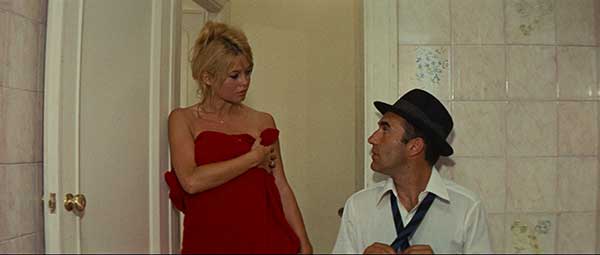60 years on from its initial release, Jean-Luc Godard’s elegant and layered Le Mépris (Contempt) remains a landmark achievement in his career and the French New Wave.
Few directors would try to adapt Homer’s ‘Odyssey’; even fewer would be able to do it successfully. The late Jean-Luc Godard has that rare achievement. Released right in the middle of the French New Wave, Le Mépris (Contempt) stands as one the great examples of this movement due to its long takes, extended scenes of dialogue, loose narrative, and reflective commentaries that produce meaty, challenging questions that, for the most part, don’t get answered clearly. Where other Godard films like Breathless (1960) or Pierrot le Fou (1965) have more chaotic energy, Le Mépris takes a softer approach, gracefully guiding us through the engulfing story of creativity, divorce, and infidelity that plays out like a Greek tragedy. The journey is unforgettable; the aftermath is even more spectacular.
There are many reasons why Le Mépris ranks at number 57 on Sight and Sound’s most recent Greatest Films of All Time poll. This may have been a drop from 21st in the 2012’s critics’ poll, but Le Mépris’ enduring qualities of abstractness, absurdism and experimentation, and the fact it remains so difficult to define, have ensured Godard’s film will always be important within the history of film. The free-flowing, ever contorting plot is constantly looking at and reflecting on itself, us, and film as a medium.
Adapted from Alberto Moravia’s novel ‘Il Disprezzo’, Le Mépris tells the story of married couple Camille and Paul, played by French acting heavyweights Brigitte Bardot (The Truth) and Michel Piccoli (Belle de Jour). Paul is a playwright and screenwriter, flown into Italy by ill-tempered producer Jeremy Prokosch (Jack Palance, City Slickers) to help revive the failing film adaptation of the ‘Odyssey’. Fritz Lang (Metropolis, M) plays himself as the director helming the adaptation.
Godard always pushed the boundaries of cinema, fascinated with the merging of realism and fantasy; in Le Mépris, he starts with a voiceover listing the cast and crew credits of his film, shooting a camera and its crew tracking an actress walking. At the end of this brief opening, the camera Godard captures points back at his own, and in turn at us. It’s a monolithic piece of technology, brutal but majestic in its heavy, accusing form and limitless potential. A quote by French film critic André Bazin about film reinforces this meta curtainraiser. Le Mépris is many things, but perhaps more than anything it is a consistent reflection on the medium of film.

As the fractious creative process advances in Le Mépris, Camille and Paul’s own relationship creaks dramatically. The plot continually morphs unexpectedly, as do the characters. Camille flaunts a short-haired, black wig at one point, covering her long, blonde hair; appearances are only illusions in Le Mépris, and people change over time. Homer’s epic poem is also reflected in the onscreen events, with characters discussing its themes and story whilst the same things happen to them. At times it is blindingly obvious (Paul at one point is wrapped in a white bed sheet, Greek-style), at others it is alluringly unclear.
Perhaps the pinnacle of Le Mépris comes in its middle section, a lengthy scene set in Camille and Paul’s spacious, open-plan apartment. Extended scenes of dialogue play out via tracking shots and flowing camera movements, both excellent examples of the French New Wave. At important moments, Godard quick cuts to images from previous scenes, the chronology of the narrative consistently tested and bent.
This apartment scene gives us plenty to work with: the dramatic disintegration of Camille and Paul’s marriage plays out in real-time, but Godard goes deeper than most would dare, somehow making Le Mépris highly personal and emotive, but also drastically existential. The scene is a masterpiece on a technical level and in terms of staging and blocking, but it is also indicative of Le Mépris’ wandering, searching qualities, just like in the ‘Odyssey’. Godard even inserts moments of absurd humour in both this scene and the film as a whole, whether it is Jeremy reading great prose from a miniature book or a door with a hole in the middle still being used like normal.
Such is the magnitude of his work, it is impossible to fully confirm Le Mépris as Godard’s greatest film. Aside from his obvious French New Wave works such as Band of Outsiders (1964), he made a medium-defining documentary in the form of Histoire(s) du cinéma, and Le Mépris stands as importantly and influentially as these other films. Throughout Le Mépris, George Delerue’s (A Little Romance) gorgeous, fateful, mournful original score accompanies the viewer and Camille as she struggles to break free from her stifling life. Bardot is so often framed in isolation or chopped off by the screen, slipping away from reality.
Near the end of Le Mépris, Godard reverts back to the camera as a subject and a tool: we see Paul from Camille’s point-of-view, the lens lingering on his face, pleading with him as Camille to snap out of his destructive indifference. Le Mépris concludes tragically, mournfully, even frustratingly, and in some ways, hopefully – a welcome juxtaposition that perhaps only Godard could achieve so elegantly. Such is this complexity, watching Le Mépris again will gift you different interpretations, contrasting emotions, and new outlooks.
Le Mépris (Contempt) will be available to own on 4K UHD for the first time, on Blu-Ray, DVD and Digital on 26 June, 2023.

